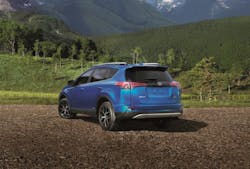Toyota May Halt US Imports of Some Models on Tariffs
Toyota Motor Corp. may stop importing some models into the U.S. if President Donald Trump raises vehicle tariffs, while other cars and trucks in showrooms will get more expensive, according to the automaker’s North American chief.
The Japanese carmaker is busy analyzing scenarios about how tariff schemes could affect each of its car and truck lines, said Jim Lentz, CEO for Toyota’s North American operations.
“If it winds up being 10% or 25%, almost on a series-by-series basis, we’ve got to evaluate what we’re going to do,” he said in an interview. “In some series, we may raise prices. On other series, we may stop imports, and then consumers will have less choice.”
Trump’s Commerce Department held a hearing on July 20 on its probe into whether imports of passenger vehicles compromise U.S. national security. Lentz said this idea is flat-out wrong. With regards to the U.S., Mexico and Canada renegotiating the North American Free Trade Agreement, Lentz said he favors three-way talks, not a separate U.S.-Mexico deal that Trump said this week he’s considering.
Toyota is in the process of building its 11th U.S. factory, a joint car-assembly plant with Mazda Motor Corp. in Huntsville, Ala. It has no plans to add another production facility, Lentz said.
Still, Toyota imported more than half of the 2.4 million vehicles it sold in the U.S. last year, including several of its top-selling and highest-profit vehicles. The RAV4 crossover took over as Toyota’s leading model in the U.S. last year, with sales jumping 16% to about 408,000. All of them were shipped into the country from Japan and Canada.
Canada also supplied 95% of the roughly 108,000 Lexus RX sport utility vehicles sold in the U.S. last year. By contrast, about 90 percent of the more than 387,000 Camry sedans sold in the U.S. last year were built in Kentucky.
Lentz said he supports Trump’s efforts to help automakers in other areas, including by re-examining fuel economy standards and cutting tax rates.
“There are many things the administration has done that have created a pretty strong economy,” Lentz said. He spoke in Detroit, where the late Kiichiro Toyoda -- who transitioned the family business from looms to cars -- was inducted into the Automotive Hall of Fame.
New levies may have to be considered when deciding locations for future powertrain or component factories, Lentz said.
“Could politics play into that? Could we decide, even if we could build them cheaper somewhere else, to build them in the U.S.?” Lentz said. “It could happen, but you don’t want to do too much of that -- you’ve still got to run a business.”
By John Lippert
About the Author
Bloomberg
Licensed content from Bloomberg, copyright 2016.
